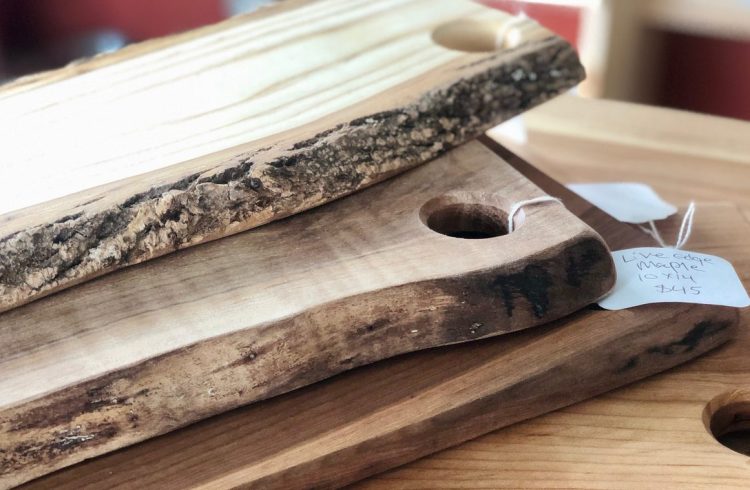Neal Foley always tries to choose the most interesting wood to make his cutting boards, such as the piece of an old apple tree that was “buggy and wild looking.” He reluctantly put it up for sale, and it was so like a work of art that the buyer hung it on a wall.
“They really speak to me,” Foley said of the scraps of wood that still have a “live edge” of bark on the side. He collects the wood from orchards that are being pruned, and from his business, Foley’s Custom Sawmill in Waldoboro, which specializes in “urban tree salvage.” It is all sustainably harvested American hardwood, such as cherry, ash, maple and birch.
Foley, a farmer and chef who was trained at Ballymaloe Cookery School in Ireland, is the farm manager at East Forty Farm in Waldoboro, where he lives with his wife, Allison Lakin, founder of Lakin’s Gorges Cheese. He has taught cooking classes for the past 15 years, and started making cutting boards in 2012.
“At first, I needed a cutting board for myself, and I’ve always worked with live-edge wood,” he said. “I’ve spent the last 25 years working at a sawmill, and I’ve always loved the natural edge look of live edge.”
Eventually, he started selling the cutting boards at farmers markets and using them in cooking classes and culinary workshops.
The wood is planed, sanded and then air-dried for a year and a half or two years before he turns it into cutting boards, because air-dried hardwood holds a good finish and is more durable, Foley said. He uses a finish of mineral oil and beeswax. The boards can warp, so they shouldn’t be left in the sink where they’ll get wet, or put through the dishwasher.
“They expand and contract with the seasons as well,” Foley said. “It remains a living thing.”
Foley’s cutting boards range in price from $20 for smaller boards up to $150 for boards that are more like a serving platter. The average price is $35-$45, he said. Buy them at the farm store at the East Forty Farm and Dairy, 2361 Friendship Road, Waldoboro, and through Foley’s Custom Sawmill.
— MEREDITH GOAD
Send questions/comments to the editors.


